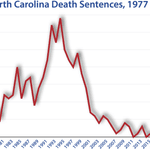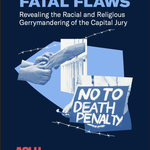
State & Federal
North Carolina

Timeline
1973 — North Carolina reinstates the death penalty following Furman v. Georgia.
1974 — The North Carolina legislature enacts a mandatory death penalty statute.
1977 — The U.S. Supreme Court strikes down North Carolina’s mandatory death sentencing scheme in Woodson v. North Carolina.
2001 — The Indigent Services Commission is founded, ensuring that defense counsels are properly trained, educated, and qualified. The ISC is responsible for the allocation of resources for experts, investigators, and other expenses incurred in defending a capital trial.
2006 — The Innocence Inquiry Commission is created by the North Carolina General Assembly, responsible for reviewing innocence claims and conducting hearings.
2009 — North Carolina passes the Racial Justice Act, which prohibits seeking or imposing the death penalty on the basis of race.
2013 — North Carolina legislature repeals the Racial Justice Act.
2015 — North Carolina Supreme Court vacates rulings that reduced four death row prisoners’ sentences to life without parole under the state’s Racial Justice Act.
2018 — North Carolina Supreme Court agrees to hear appeals from three of the four death row prisoners whose sentences were reduced and then reinstated.
2019 — North Carolina imposes first death sentence in more than a decade when a capital sentencing jury votes to sentence Seaga Gillard to death.
2019 — North Carolina Supreme Court hears arguments on whether the state may retroactively apply the legislative repeal of the Racial Justice Act in 2013, restoring the rights of approximately 140 death row prisoners seeking redress of death sentences they claim were affected by racial bias.
2020 — North Carolina Supreme Court restores life sentences given to three of the death row prisoners whose sentences were reduced and then reinstated following the 2013 repeal of the Racial Justice Act.
2021 — A North Carolina judge orders prosecutors to disclose decades worth of data pertaining to jury selection in capital cases.
2022 — North Carolina ACLU lawyers file a challenge to the method in which jurors are selected, arguing that the process of “death qualification” produces racially and sexually unrepresentative juries.
Notable Exonerations
Henry McCollum and Leon Brown, two brothers who were convicted of murder and sentenced to death in 1984, were freed in 2014 because of evidence uncovered by the North Carolina Innocence Inquiry Commission. McCollum was 19 and Brown was 15 when they confessed to the rape and murder of 11-year-old Sabrina Buie. Both men are intellectually disabled — McCollum has an IQ in the 60s and Brown has scored as low as 49 on IQ tests. McCollum and Brown have maintained their innocence since their trial, saying they were unaware they were signing a confession.
Jonathon Hoffman, a black man charged with killing a white man, was tried and convicted by an all-white jury despite the fact that no physical evidence connected him to the murder of Danny Cook. The prosecutors in his case withheld evidence that was favorable to Hoffman. Neither the defense attorney nor the judge knew of a deal in which prosecutors paid Hoffman’s cousin to testify against him — an omission that resulted in the criminal investigation of Ken Honeycutt and Scott Brewer, the prosecutors in the original trial. Charges were dismissed in 2007, after Hoffman had spent 12 years on death row.
Glen Edward Chapman was granted a new trial in 2007, due to withheld evidence, “lost, misplaced or destroyed” documents, the use of weak, circumstantial evidence, false testimony by the lead investigator, and ineffective assistance of defense counsel. There was also new information from a forensic pathologist that raised doubts as to whether the murder for which Chapman was convicted was a homicide or caused by an overdose of drugs. Chapman was released in 2008, when charges against him were dropped.
Levon “Bo” Jones’ conviction was overturned due to his defense counsel’s “constitutionally deficient” performance. In April 2008, shortly before a retrial was set to begin, Jones’ new defense team filed an affidavit in which the star witness from his first trial said, “Much of what I testified to was simply not true.” Jones spent 15 years on death row, and was released in May 2008
Milestones in Abolition/Reinstatement
Following the U.S. Supreme Court’s 1972 decision in Furman v. Georgia, invalidating all death sentences nationwide, the North Carolina Supreme Court reviewed North Carolina’s death penalty statute in 1973 in State v. Waddell. The Waddell court held that the unconstitutionality of North Carolina’s death penalty statute could be resolved by severing the portion of the statute that allowed a jury to recommend either a life sentence or a death sentence. The decision therefore made future death sentences mandatory. In 1974, the North Carolina legislature followed the Waddell decision by enacting a mandatory death penalty statute.
Three years later, the U.S. Supreme Court struck down North Carolina’s mandatory death sentencing scheme in Woodson v. North Carolina. The North Carolina legislature responded by enacting a new death penalty statute that took effect on June 1, 1977.
In August 2009, North Carolina passed the Racial Justice Act, which prohibited seeking or imposing the death penalty on the basis of race, included the use of statewide statistical evidence to show a pattern of racial discrimination, and applied retroactively for one year.
Kentucky was the first state to pass a Racial Justice Act, though NC’s RJA differed from Kentucky’s as it allowed for retroactive application and also permitted the use of statistical evidence to show that race was a “significant factor in decisions to seek or impose the sentence of death in the county, the prosecutorial district, or the State at large at the time the death sentence was sought or imposed.”
In 2013, the legislature repealed the Racial Justice Act. Prior to repeal, four inmates had been granted relief under the act, but those decisions were vacated by the North Carolina Supreme Court in December 2015.
North Carolina “Firsts”
Indigent Services Commission, created in July, 2001, developed standards governing the qualifications of defense counsel, required counsel to seek consultations with the Center for Death Penalty Litigation prior to trial, took over the responsibility of appointing and compensating counsel through the Office of the Capital Defender, provided increased training and supervision of attorneys, and took over responsibility for allocating the resources for experts, investigators, and other expenses incurred in defending a capital trial.
Innocence Inquiry Commission
The North Carolina Innocence Inquiry Commission is the first of its kind in the nation. The Commission was created by the North Carolina General Assembly in 2006 and began operating in 2007. Since then, the Commission has reviewed hundreds of innocence claims and conducted multiple hearings. On February 17, 2010, Gregory Taylor was the first person to be exonerated by this unique process. Mr. Taylor was declared innocent by a panel of three judges after serving 17 years for a murder that he did not commit.

Resources
- North Carolina Coalition for Alternatives to the Death Penalty
- Center for Death Penalty Litigation
- Department of Corrections
- North Carolina Conference of District Attorneys
- Indigent Defense Services
- Victims’ services
- The Death Penalty in North Carolina: A Summary of the Data and Scientific Studies by Dr. Matthew Robinson of Appalachian State University
- People of Faith Against the Death Penalty

North Carolina Execution Totals Since 1976
News & Developments
News
Oct 01, 2025
North Carolina Legislature Passes Sweeping Criminal Law Legislation in Effort to Restart Executions
On September 23, 2025, North Carolina lawmakers approved and forwarded to Governor Josh Stein for signature House Bill 307 — also known as“Iryna’s Law” — which proposes sweeping changes to the state’s criminal laws. HB 307 imposes stricter pretrial release conditions, requires involuntary mental health evaluations for defendants under certain circumstances, shortens the timeline for capital case appeals, and provides an alternative to the current method of…
Read MoreNews
Jul 08, 2025
ACLU Report Shows How Death Penalty Jury Selection Discriminates Against Black Americans, Women, and People of Faith
A new report from the ACLU documents how the process of selecting juries for death penalty cases systematically excludes Black prospective jurors, women, and people of faith, fundamentally undermining the constitutional promise of a trial by a jury of one’s peers. The report, Fatal Flaws: Revealing the Racial and Religious Gerrymandering of the Capital Jury, examines the practice of“death qualification,” a requirement that potential jurors must be…
Read MoreNews
Jun 04, 2025
2025 Roundup of Death Penalty Related Legislation
More than one hundred bills have been introduced this year in 34 states and in Congress to expand and limit use of the death penalty, abolish and reinstate the death penalty, modify execution protocols and secret the information about them, and alter aspects of capital trials. Thus far, nine bills in five states have been enacted, with Florida enacting the most legislation. Of the bills that have been signed into law, three modify execution protocols; two expand…
Read MoreNews
Mar 28, 2025
“He Looks a Little Like the Defendant”: A Closer Look at the History of Racial Bias in Jury Selection
As closing arguments of his trial began in Johnston County, North Carolina, Hasson Bacote watched as Assistant District Attorney Gregory Butler urged the jury to sentence him to death. Mr. Bacote, a Black man, had been convicted of fatally shooting 18-year-old Anthony Surles during a robbery when Mr. Bacote was just 21 years old. Mr. Bacote admitted he had fired a single shot out of a trailer, but said he did not know that he hit anyone.“Hasson Bacote is a thug: cold-blooded…
Read MoreNews
Feb 10, 2025
Focus on Race: Henderson Hill’s Legacy in the Death Penalty Movement
Henderson Hill has dedicated his career to placing race and the death penalty on trial. This month, the Death Penalty Information Center celebrates Black History Month by recognizing Mr. Hill’s ongoing contributions to the modern death…
Read More


